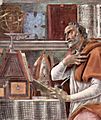Philosophical skepticism facts for kids
Philosophical skepticism comes from the Greek word skepsis, which means "enquiry" or "looking into something." It's a way of thinking that started in Ancient Greece and has been used in many different cultures.
People who are philosophical skeptics often question the ideas and beliefs of their time. This can lead them to doubt things. This doubt might mean they don't believe there are easy answers to big questions, or they might be agnostic (meaning they don't know if God exists). Some even question if the world around us is truly real.
One type of skepticism is scientific skepticism. This means looking closely at claims that don't have clear proof or evidence. Scientists often use this approach to test new ideas.
Skepticism in History
In Islamic philosophy, a thinker named Al-Ghazali, also known as "Algazel" in the West, helped start philosophical skepticism. He was part of a religious school called Ash'ari. Some people think that the famous French thinker Rene Descartes might have been influenced by Al-Ghazali's ideas when he wrote his book Discourse on the Method.
Images for kids
-
Indian skepticism towards dogmatic statements is illustrated by the famous tale of the Blind men and an elephant, common in Buddhism and Jainism.
See also
 In Spanish: Escepticismo filosófico para niños
In Spanish: Escepticismo filosófico para niños
 | Bessie Coleman |
 | Spann Watson |
 | Jill E. Brown |
 | Sherman W. White |











